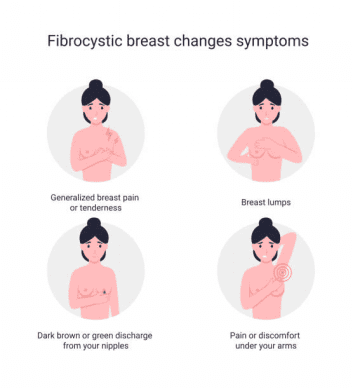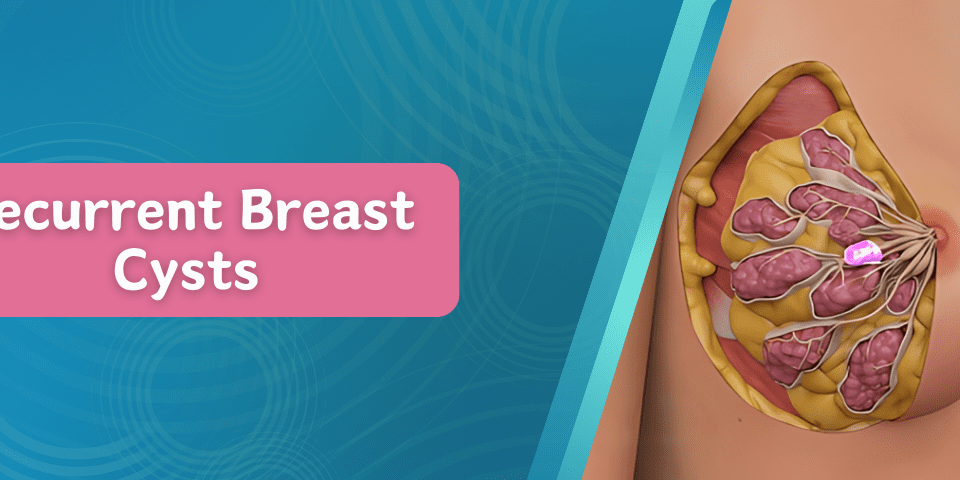The fear of breast cancer looms large for many, and discovering breast cysts is particularly alarming and stressful. While breast cysts are often benign, their recurrence can cause significant anxiety and lower a patient’s hope. Each new cyst brings a wave of anxiety, overshadowing the relief that usually follows a benign diagnosis.
Dr. Garvit Chitkara, a seasoned breast cancer surgeon in Mumbai, understands the emotional toll this cycle can take. He explains:
“Breast cysts are fluid-filled sacs within the breast that are mostly benign. However, their recurrent nature can be both physically uncomfortable and mentally taxing for patients. With breast cancer affecting over 2 million women globally each year, the concern is not just understandable but also prudent.”
Are you or a loved one facing recurrent breast cysts? Please seek the guidance of a qualified breast cancer specialist for accurate diagnosis and peace of mind.
Is it normal to get recurring breast cysts?
Yes, it is normal for some women to experience recurring breast cysts. Breast cysts are fluid-filled sacs that can appear and disappear, especially common among women between the ages of 35 and 50. While these are generally non cancerous breast cysts, the recurrence can be a source of significant emotional distress.
Dr. Chitkara, a trusted doctor for benign breast disease treatment in Mumbai, adds:
“Many women find themselves in a cycle of relief when a cyst under breast resolves, followed by anxiety when it reappears. This emotional rollercoaster underscores the importance of regular monitoring and consultation with healthcare professionals. Persistent or recurrent cysts, while usually harmless, warrant a thorough evaluation to ensure ongoing health and peace of mind.”
Why do breast cysts keep coming back?
Breast cysts can recur for several reasons, including:
Hormonal changes related to menstrual cycles
Diets high in fats can influence hormonal balance, potentially leading to the formation of cysts
Although evidence is inconclusive, some studies suggest a link between high caffeine intake and the recurrence of breast cysts
A family history of breast cysts
Fibrocystic changes of breast due to hormonal fluctuations
Dr. Garvit Chitkara, an eminent breast cancer surgeon in Mumbai, explains:
“Fibrocystic breast changes, characterized by lumpy tissue and recurrent fluid-filled cysts, fluctuate in size and sensitivity with the menstrual cycle. While these changes are benign, they can complicate the detection of breast abnormalities, underscoring the importance of consistent monitoring.”
Are you experiencing recurrent breast cysts and wondering about the underlying causes? It’s best to consult a certified breast cancer doctor to discuss your symptoms and get personalized advice.
Symptoms of recurrent breast cysts
Understanding the symptoms of recurrent breast cysts is crucial for early detection and management. Here are the common symptoms associated with this condition:
Breast Lumps: Women often feel one or more round, movable lumps with distinct edges in their breasts.
Breast Pain and Tenderness: These cysts can cause discomfort, especially before or during the menstrual cycle.
Size Fluctuations: The size of the cysts may change throughout the menstrual cycle, typically increasing before menstruation.
Nipple Discharge: Although less common, some cysts near the nipple may cause clear or slightly milky discharge.

Recognizing these symptoms can prompt timely consultations with healthcare professionals, which is essential for managing the condition effectively.
The thought of cancer is daunting, especially with recurring cysts. Find out whether recurrent breast cysts could be a sign of something more serious and what to look out for.
Can a recurring cyst be cancerous?
While most recurring breast cysts are benign, it is essential to monitor them carefully. Regular check-ups, biopsies, imaging tests, such as mammograms or ultrasounds, play a crucial role in distinguishing benign cysts from potential malignancies.
Dr. Garvit Chitkara emphasizes the importance of vigilance, stating, “Although the vast majority of these cysts are non-cancerous, any sudden changes in their size, shape, or consistency, warrant immediate attention. This proactive approach is essential in ensuring peace of mind and optimal breast health.”
With over 15 years of expertise, Dr. Chitkara is a sought-after doctor for breast cancer surgery in Mumbai.
Preventive Measures
Preventing recurring breast cysts involves several lifestyle and health management strategies.
Balanced Diet: Consuming a nutritious and well-balanced diet that includes plenty of fruits, vegetables, and whole grains can aid in hormone regulation and lower the likelihood of cyst formation. Limiting caffeine and high-fat foods might also be beneficial, although the evidence varies.
Regular Exercise: Engaging in regular physical activity helps maintain a healthy weight and hormone balance, which can decrease the likelihood of cyst development.
Stress Management: Since stress can impact hormonal balance, managing stress through techniques like yoga, meditation, or therapy may help reduce the occurrence of cysts.
Limiting Hormone Therapy: If you’re using hormone replacement therapy (HRT), discuss the potential effects on breast tissue with your doctor. In some cases, adjusting or discontinuing HRT can reduce the risk of cysts.
Regular Breast Exams: Performing monthly breast self-exams and scheduling regular clinical breast exams can help detect changes early and allow for prompt treatment if necessary.

By incorporating these strategies, individuals can actively participate in managing their health and potentially reduce the frequency of breast cysts.
Conclusion
The fear of breast cancer is real and palpable for many women. Discovering recurrent breast cysts can be a distressing experience. Breast cysts can significantly impact a woman’s life, causing physical discomfort and emotional stress. If you’ve noticed breast cysts returning time and again, you’re not alone. However, with the expertise of breast cancer surgeons like Dr. Garvit Chitkara, you can navigate these challenges effectively. Early detection, appropriate management, and compassionate care can help you maintain an optimal quality of life.
If you have concerns about recurrent breast cysts, seeking professional medical advice is a vital step toward peace of mind and health. Remember, proactive management and regular check-ups can help you stay ahead in maintaining your breast health. Don’t hesitate to consult with a specialist to explore your options and take control of your health journey.
Frequently Asked Questions:
What are the treatment options for recurrent breast cysts?
Treatment options for recurrent breast cysts include fine-needle aspiration to drain the fluid, hormone therapy to reduce cyst formation, and surgical removal in persistent cases. Your doctor will recommend the best approach based on your specific condition and symptoms.
How many breast cysts are normal?
Having one or a few breast cysts is quite common, especially in women between 35 and 50 years old. However, if you notice a significant increase in the number of cysts, it’s essential to consult your doctor for further evaluation.
Can a breast cyst burst on its own?
Yes, a breast cyst can burst on its own, but it’s relatively rare. If a cyst bursts, you might experience sudden pain and tenderness in the area, which usually subsides as the fluid is absorbed by the body.
Do breast cysts hurt when pressed?
Breast cysts can be tender and painful when pressed, especially if they are large or located near sensitive tissue. The discomfort can vary from mild to severe, depending on the size and location of the cyst.
Reference Links:
https://www.mayoclinic.org/diseases-conditions/breast-cysts/diagnosis-treatment/drc-20370290

